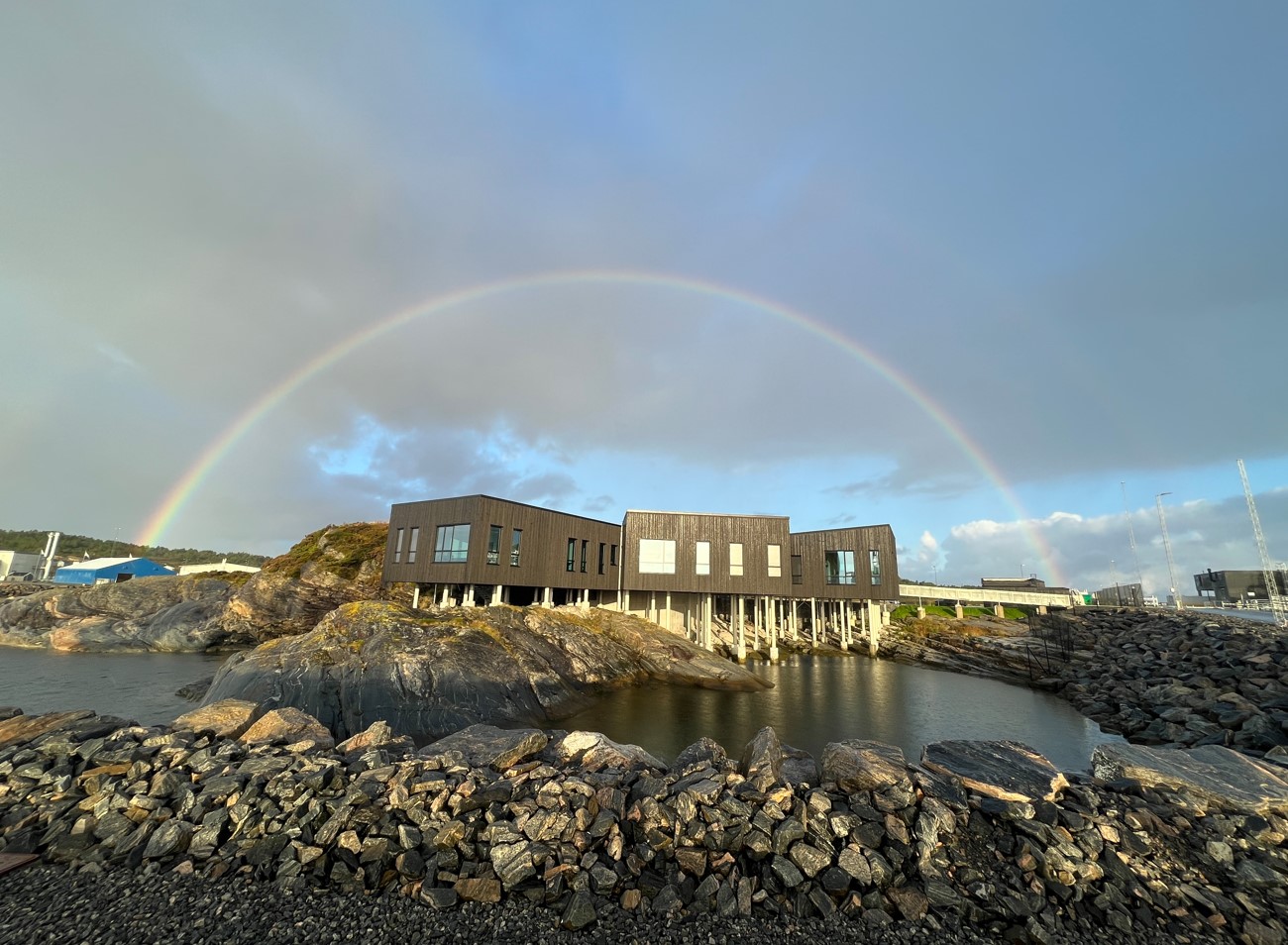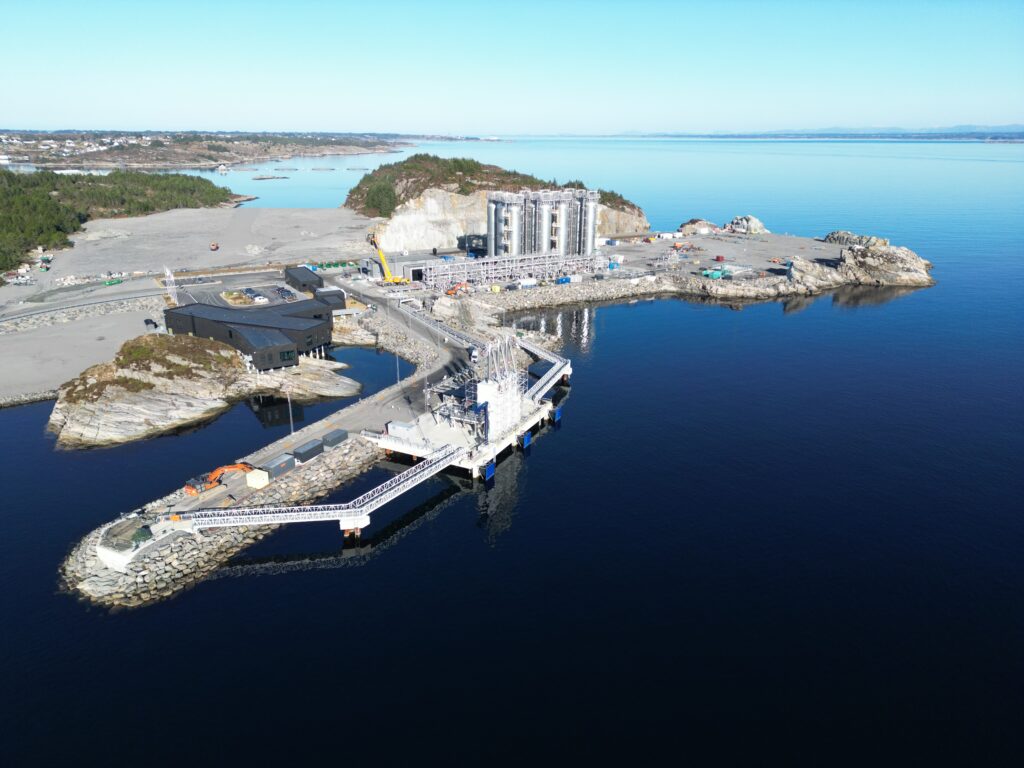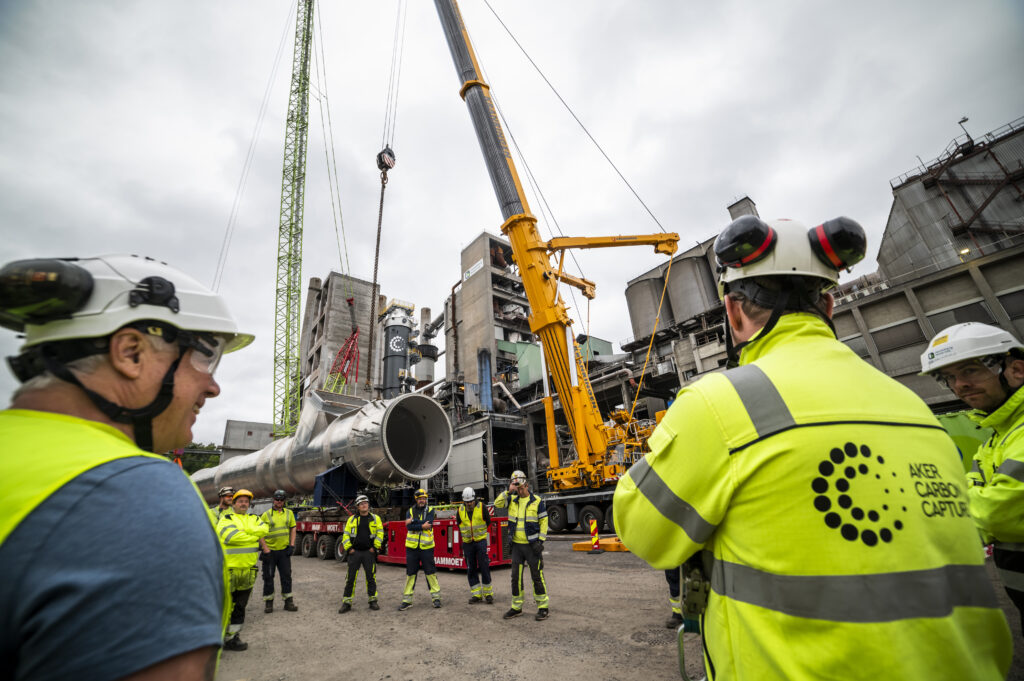
27.06.2024
Current Status of the Longship Project
What is the status of Norway’s largest industrial climate project, featuring technology described by the UN as one of the world’s most crucial for the climate?
Longship is a carbon capture, transport, and storage project (CCS) partially funded by the state. The project involves industrial partners Heidelberg Materials, Hafslund Celsio, and the Northern Lights consortium. The plan is for CO2 from the capture facilities of Heidelberg Materials and Hafslund Celsio to be transported by ship to a reception facility near Bergen. From there, it will be conveyed via pipeline for permanent storage in a reservoir 2,600 meters below the seabed.

Progress of Longship
Construction of Northern Lights’ CO2 transport and storage infrastructure and Heidelberg Materials’ capture facility in Brevik is progressing. As of now, the Brevik CCS is 76 percent complete, while Northern Lights’ storage facility is 94 percent complete. In April 2023, Hafslund Celsio decided to pause the implementation of CO2 capture at the waste-to-energy plant in Klemetsrud, to explore various cost reduction options.
Operational in 2025
Longship, with captured CO2 from Brevik and Northern Lights’ transport and storage, will be operational in 2025. Northern Lights will also transport and store up to 800,000 tons of CO2 annually from Yara’s ammonia and fertilizer plant in Sluiskil, Netherlands – in addition to 430,000 tons of biogenic CO2 per year from Ørsted’s two power plants in Denmark, starting in 2026.
This will utilize the overcapacity in Northern Lights infrastructure already established through Longship.
In December 2023, Northern Lights was nominated by the EU Commission to receive 131 million euros from the Connecting Europe Facility (CEF) for Phase II construction.
Project Status in Detail

Heidelberg Materials
As of April 30, 2024, the cumulative progress for the Brevik CCS project is 76.2 percent.
Brevik CCS and Aker Carbon Capture (the capture technology provider) aim to be mechanically complete (construction finished and the facility ready for commissioning) by December 1, 2024.
Work and progress in April 2024 have increased the likelihood of achieving this milestone.
A significant milestone was reached in early May 2024, with the placement of the compressor and compressor motor. Another major milestone was achieved in August 2023, with the placement of the absorber and absorber stack.
The state and Heidelberg Materials have signed an agreement ensuring the completion of the capture project following communicated cost overruns. According to the agreement, Heidelberg Materials is committed to completing the project and covering increased costs. In return, the company retains a larger share of the potential returns. The state will provide startup support of up to 150 million NOK when the facility is ready to send the first load of CO2, to Northern Lights.
Brevik CCS is garnering significant interest both internally and externally. Since the inception of Longship, Heidelberg Materials has made further advancements in CCS and now has several planned projects. One of these is Slite CCS on Gotland in Sweden, one of Europe’s largest CCS projects, aiming to capture up to 1.8 million tons of CO2 annually. This corresponds to four percent of Sweden’s total emissions today.
Northern Lights
As of April 30, 2024, the construction of the Northern Lights CO2 storage facility is 94 percent complete. Storage infrastructure consists of an onshore reception terminal, an underwater pipeline, two injection wells, and the storage complex. Pre-commissioning and commissioning activities for the Northern Lights facilities have started or will start soon.
Dalian Shipbuilding Offshore Co., Ltd. (DSOC) is building ships dedicated to CO2 transport for Northern Lights. The overall progress for the first two ships is 88.4 percent complete (as of April 30, 2024).
Northern Lights has signed a transport and storage agreement with Yara to store up to 800,000 tons of CO2 annually from Yara’s ammonia and fertilizer plant in Sluiskil, Netherlands – starting in 2025. The agreement is approved by the Norwegian Ministry of Energy. Northern Lights has also signed a transport and storage agreement with Ørsted to store 430,000 tons of biogenic CO2 annually from two power plants in Denmark, starting in 2026.
Northern Lights has ambitious growth plans, aiming to expand storage capacity in line with market development and the maturation of commercial agreements. For the next phase of development, Northern Lights aims for an additional capacity of 3.5 million tons per year.
Northern Lights was nominated to receive 131 million euros under the EU’s Connecting Europe Facility (CEF) funding scheme. Nearly 480 million euros have been allocated from the CEF to four CO2 transport and storage projects in Europe. According to the European Commission, these projects represent the first building blocks of a future European carbon value chain, planned to be completed by the end of the decade. This is expected to contribute to the EU’s decarbonization goals by 2030.
Northern Lights is included as a Project of Mutual Interest (PMI) by the European Commission, on the new list of the EU’s energy projects of common and mutual interest.
Northern Lights received 894 visitors to the facility in April, bringing the total number of visitors to over 8,000 since its inception.
Hafslund Celsio
In April 2023, Hafslund Celsio decided to pause the implementation of the CO2 capture project at the waste-to-energy plant in Klemetsrud. This was done to evaluate various cost reduction solutions. The company’s own estimates showed that the expected costs of the project were about three billion NOK higher than at the investment decision.
Hafslund Celsio is owned by Hafslund, Infranode, and HitecVision. On June 1 of this year, the company changed its name to Hafslund Celsio to align with other fully or partially owned companies of Hafslund.
Celsio has signed two FEED contracts with Aker Carbon Capture and Aker Solutions. This is to develop carbon capture at the waste-to-energy plant in Klemetsrud, and one with Aker Solutions for interim buffer storage at the Port of Oslo. The capture facility will be based on Aker Carbon Capture’s modular Just Catch 400 unit, with a design capacity to capture up to 400,000 tons of CO2 per year.
A new project basis will be submitted to the government in the summer of 2024. Government will decide on support for the project and any changes to the state support agreement, once a sufficiently mature and quality-assured project basis is available.
The changes in the CCS project in Oslo do not affect the completion of Longship as a full chain for the capture, transport, and storage of CO2. Heidelberg Materials is capable of capturing CO2, and Northern Lights is capable of transporting and permanently storing CO2 from 2025.
